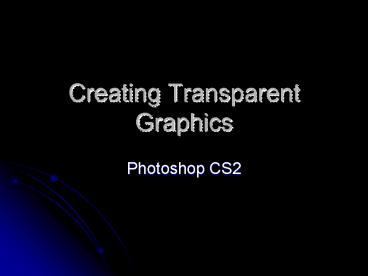Creating Transparent Graphics - PowerPoint PPT Presentation
1 / 21
Title:
Creating Transparent Graphics
Description:
You'll also learn how to simulate transparency with the JPEG format ... drop shadows, glows, feathered edges, or anti-aliased edges use an 8-bit (or 256 ... – PowerPoint PPT presentation
Number of Views:114
Avg rating:3.0/5.0
Title: Creating Transparent Graphics
1
Creating Transparent Graphics
- Photoshop CS2
2
Transparent Graphics
- In Chapter 10 you will learn several techniques
for creating transparent GIFs. - Youll also learn how to simulate transparency
with the JPEG format - GIF transparencies can produce unwanted halos
around the graphics, you will learn tools to help
counter this problem
3
Transparent Graphics
- All computer-generated graphics are rectangular
or square - You can work around the rectangular limitation by
creating transparent GIFS - Currently, GIF is the only file format in wide
use on the Web that supports transparency
4
Limitations of GIF Transparency
- Graphics with soft edges, such as drop shadows,
glows, feathered edges, or anti-aliased edges use
an 8-bit (or 256 level) transparency. As a
result, edges appear smooth. - GIF file formats supports only 1-bit masking
instead of 8-bit transparency which means pixels
in a GIF are either fully transparent or fully
opaque. - The 1-bit masking limitation causes unattractive
halos (sometimes called a fringe or matte) - (see page 297 for examples)
5
Transparent Layers
- Transparent layers are recognized by the
checkerboard pattern in the background of images.
6
GIFs, Masks, Transparency
- GIF A file format for optimizing Web graphics.
Best used for flat or simple graphic images. - Masks hide the visibility of specific areas of
an image. - Transparent means you can see through pixels
to images or layers below. - Transparent GIF include an invisible mask that
hides and shows transparent areas of the image in
a Web browser.
7
Transparent GIFs
- If youre designing a Web site with a flat,
single-color background color, you can
incorporate that color into the background of
your image, but, - If your background image is made with a pattern
or a photograph, your foreground image will not
line up correctly with the background image you
end up with an unwanted offset.
8
Creating Transparent GIFs
- Choosing the Image selection from the Output
settings tells ImageReady CS2 you want to specify
the image as a foreground image, not a background
image.
9
Transparent GIFs
- Output Settings dialog box
- Choose the image from your computer that you want
to use as a background image
10
Transparent GIFs
- Preview in browser to see your results and notice
the transparency settings are working
11
Fixing Edges of Transparent GIFs
- To remove the halo that is around the image,
select the background color with the eyedropper - Choose Foreground Color from the Matte pop-up
menu in the Optimize panel
12
Fixing Edges of Transparent GIFs
- In the Original image you can see the edges fade
from opaque to transparent - In the optimized image (Preview tab) you an see
the edges fade to beige
13
- TIP
- Switching back to the Original tab is important.
You can only edit your image when the Original
tab is active
14
Fixing Soft Edges
- When you add a glow the matte color surrounds the
glow - The image glow keeps its integrity when previewed
in the browser
15
Create Transparent GIFs from Nontransparent Images
- With a nontransparent image open in Photoshop
click File gt Save for Web - Select the Gif and Transparency options, notice
that nothing happens because the image does not
contain any transparent pixels
16
Create Transparent GIFs from Nontransparent Images
- With the eyedropper tool, select the light green
color around the outside of the image
17
Create Transparent GIFs from Nontransparent Images
- Click the Map Transparency button on located on
the bottom of the color table
18
Create Transparent GIFs from Nontransparent Images
- The light green pixels turn to transparent pixels
indicated by the checkerboard pattern
19
Create Transparent GIFs from Nontransparent Images
- To create transparent pixels in the image itself
use the Magic Eraser from the Toolbox, works best
on solid colors
20
Simulate Transparency with JPEGs
- So far weve learned how to optimize transparency
as GIFs because GIF is currently the only Web
file format that supports transparency. - But, what if you have a continuous tone image,
such as a photograph with areas of transparency? - Well simulate transparency using the JPEG file
format, but there are limitations
21
Simulate Transparency with JPEGs
- From the Optimize palette select a Matte color to
match the BG of your image - Choose Preview and see the transparent pixels
turn to the background color - Works best with flat colors rather than patterned
backgrounds































